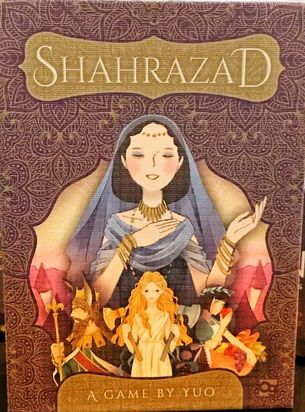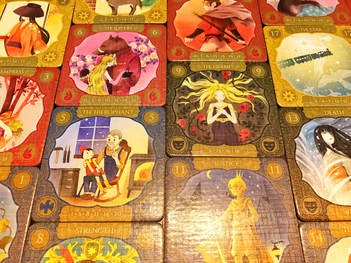 For a full playthrough of Shahrazad, click here. What is this game about? Shahrazad is an abstract tile laying game for 1–2 players. The premise of the game is that you are Scheherazade from 1001 Nights, and you are spinning a tale for your murderous husband. Your story, however, needs to be coherent—which means that you score based on how well the tiles that comprise your story "make sense." To simulate coherence in a story, the game requires that as you place your tiles in columns from left to right, numbers need to ascend (for example, you can't put the 17 tile to the right of the 18 tile). You also score points for making sure that cards of the same suit/color touch each other, a goal that symbolizes well-integrated themes within your overall story. The game is played in two rounds. After the first round, you calculate your score and remove any tiles that were improperly placed from the game. Then you reshuffle the remaining tiles and play a second round. Your combined score determines how well you did in the game. Coherence can be difficult to achieve. As you draw your story tiles—only two at a time—you need to place them in ways that ultimately create a properly woven tapestry of tiles. The order the tiles come up in changes every time, so you can end up with some terrible draws. If you want to change the placement of a tile, you can replace a tile in play with a tile from your hand, but you have to play two tiles the following turn. How does it play solo? Given that Shahrazad is explicitly designed for 1–2 players, it is custom built for low player counts. In fact, I would only bring out Shahrazad for solo play. Getting your tiles placed well is difficult enough without having to factor in another player's hand—especially because in the co-op rules, you aren't actually allowed to discuss what tile you should play before you make your choice. As a solo game, Shahrazad is a more meditative experience where you can relax and enjoy the art. Shahrazad is, at heart, an abstract game, so enjoying the art—and imagining what kind of story you are trying to tell—is key to turning it into something more thematic.  Shahrazad is definitely easy on the eyes. Shahrazad is definitely easy on the eyes. Overall Thoughts Shahrazad is not a bad game, but it's not a game you're going to play a million times in a row without getting tired of it. For the price and size, it makes an excellent work night or travel game. You can be done with it in as little as 15 minutes, if you're just playing it to get a game in. I also love the Arabian Nights theme and the beautiful art. That said, there isn't a ton of variety in the game. There are only 22 tiles in the whole thing, so before long you will have admired all of the art. From there, it's just the repetitive activity of drawing tiles and figuring out where to put them. If you get the game and experience burnout, put it back on your shelf for a few months and it should regain its appeal. (That is what happened to me!) Do I recommend it? If you want it for what it is, I recommend Shahrazad. Expect a cute, short puzzle that you can pull out when you want to get a quick game in. Overall Rating: 3 stars Rating Scale: 5 stars — I love it! 4 stars — I really like it. 3 stars — I like it. 2 stars — It's okay. 1 star — Meh.
0 Comments
Your comment will be posted after it is approved.
Leave a Reply. |
AuthorMy name is Liz Davidson, and I play solo board games. A lot of solo board games... Archives
August 2021
Categories
All
|
 RSS Feed
RSS Feed